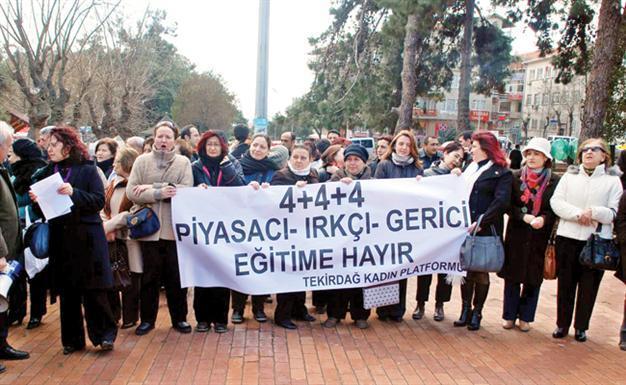NGO seeks gender segregation in education reform bill
ANKARA - Hürriyet Daily News

Tekirdağ Women’s Platform protests in the Thracean city a draft prposed by the ruling Justice and Development Party to change the country’s education system. DHA photo
The sub-panel of Parliament’s Education Commission discussed proposals submitted by civic groups and trade unions on the much-criticized education reform bill yesterday. The most controversial proposal came from the Association of Imam-Hatip Graduates, which said boys and girls should be segregated.Meanwhile, Deputy Prime Minister Bekir Bozdağ defended the bill as a move to boost vocational schools and provide a well-trained work force for the industry. “While students in vocational schools make up 65-70 percent in other countries, in Turkey it’s just the opposite. This shows that something is wrong,” Bozdağ said on Kanal 24 television.
He explained the reform would enable parents to send children to vocational schools after a four-year basic education, but would allow them to change their choices afterwards. Bozdağ defended a planned provision to allow students to opt out of school in favor of home study after eight years as “suitable to Turkey’s realities.”
The draft bill has come under fire on grounds that it would allow conservative parents to take girls from school and encourage child labor.
The sub-commission was still assessing the proposals it had collected when the Hürriyet Daily News went to print yesterday. It was scheduled to pen a report and send the draft to the Education Commission for possible revisions.
Most of the proposals suggested that pre-school be added to the compulsory education system, but the ruling Justice and Development Party (AKP) is unlikely to heed this call. In another possible change, the school starting age could be reduced from seven to six.
In the most striking suggestion, the Association of Imam-Hatip Graduates said boys and girls should be segregated for a more efficient education. Their paper included sections titled “differences in the brain due to gender” and “differences in learning due to gender.”
“Segregated education produces positive results for both sexes. It could be considered as a freedom of learning. For instance, boys studying in segregated schools can choose subjects that better suit their abilities, free from gender pressure. Gender pressure discourages boys from choosing art-related subjects such music, painting or acting,” said the paper, which otherwise lent full support to the bill.
















